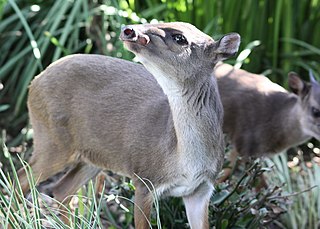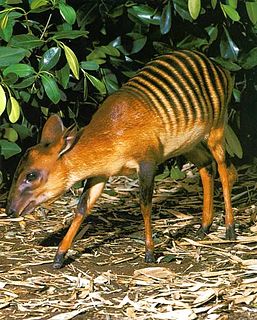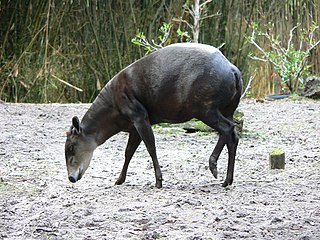
A duiker is a small to medium-sized brown antelope native to sub-Saharan Africa, found in heavily wooded areas. The 22 extant species, including three sometimes considered to be subspecies of the other species, form the subfamily Cephalophinae.
Bosman is a Dutch and Afrikaans toponymic surname, originally meaning "man who lives or works in the forest". People with this surname include:

The bay duiker, also known as the black-striped duiker and the black-backed duiker, is a forest-dwelling duiker native to western and southern Africa. It was first described by British zoologist John Edward Gray in 1846. Two subspecies are identified. The bay duiker is reddish brown and has a moderate size. Both sexes reach 44–49 cm (17–19 in) at the shoulder. The sexes do not vary considerably in their weights, either; the typical weight range for this duiker is 18–23 kg (40–51 lb). Both sexes have a pair of spiky horns, measuring 5–8 cm (2.0–3.1 in). A notable feature of this duiker is the well-pronounced solid stripe of black extending from the back of the head to the tail.

The blue duiker is a small antelope found in western, southern and eastern Africa. It is the smallest duiker. The species was first described by Swedish naturalist Carl Peter Thunberg in 1789. 12 subspecies are identified. The blue duiker reaches 32–41 centimetres (13–16 in) at the shoulder and weighs 3.5–9 kilograms (7.7–19.8 lb). Sexually dimorphic, the females are slightly larger than the males. The dark tail measures slightly above 10 centimetres (3.9 in). It has short, spiky horns, around 5 centimetres (2.0 in) long and hidden in hair tufts. The subspecies show a great degree of variation in their colouration. The blue duiker bears a significant resemblance to Maxwell's duiker.

The Jentink's duiker, also known as gidi-gidi in Krio and kaikulowulei in Mende, is a forest-dwelling duiker found in the southern parts of Liberia, southwestern Côte d'Ivoire, and scattered enclaves in Sierra Leone. It is named in honor of Fredericus Anna Jentink.
Dutch people or the Dutch are a Germanic ethnic group native to the Netherlands. They share a common culture and speak the Dutch language. Dutch people and their descendants are found in migrant communities worldwide, notably in Aruba, Suriname, Guyana, Curaçao, Argentina, Brazil, Canada, Australia, South Africa, New Zealand, and the United States. The Low Countries were situated around the border of France and the Holy Roman Empire, forming a part of their respective peripheries, and the various territories of which they consisted had become virtually autonomous by the 13th century. Under the Habsburgs, the Netherlands were organised into a single administrative unit, and in the 16th and 17th centuries the Northern Netherlands gained independence from Spain as the Dutch Republic. The high degree of urbanization characteristic of Dutch society was attained at a relatively early date. During the Republic the first series of large-scale Dutch migrations outside of Europe took place.

The black-fronted duiker is a small antelope found in central and west-central Africa.

The Maxwell's duiker is a small antelope found in western Africa.

The red-flanked duiker is a species of small antelope found in western and central Africa in countries as far apart as Senegal and Sudan. Red-flanked duikers grow to almost 15 in (35 cm) in height and weigh up to 31 lb (14 kg). They have russet coats, with greyish-black legs and backs, and white underbellies. They feed on leaves, fallen fruits, seeds and flowers, and sometimes twigs and shoots. The adults are territorial, living in savannah and lightly wooded habitats, and the females usually produce a single offspring each year. They have lifespans of ten to fifteen years in captivity.

The zebra duiker is a small antelope found primarily in Liberia, as well as the Ivory Coast, Sierra Leone, and occasionally Guinea. They are sometimes referred to as the banded duiker or striped-back duiker. It is believed to be one of the earliest duiker species to have evolved.

The yellow-backed duiker is a forest dwelling antelope in the order Artiodactyla from the family Bovidae. Yellow-backed duikers are the most widely distributed of all duikers. They are found mainly in Central and Western Africa, ranging from Senegal to Western Uganda with a possible few in Gambia. Their range also extends southward into Rwanda, Burundi, Zaire, and most of Zambia.

The red forest duiker, Natal duiker, or Natal red duiker is a small antelope found in central to southern Africa. It is one of 22 extant species form the subfamily Cephalophinae. While the red forest duiker is very similar to the common duiker, it is smaller in size and has a distinguishing reddish coloring. Additionally, the red forest duiker favors a denser bush habitat than the common duiker. The Natal red duiker is more diurnal and less secretive than most forest duikers, so therefore it is easier for them to be observed. In 1999, red forest duikers had an estimated wild population of 42,000 individuals.

White South Africans are South Africans descended from any of the white racial or ethnic groups of Europe. In linguistic, cultural and historical terms, they are generally divided into the Afrikaans-speaking descendants of the Dutch East India Company's original settlers, known as Afrikaners, and the Anglophone descendants of predominantly British colonists. In 2016, 57.9% were native Afrikaans speakers, 40.2% were native English speakers, and 1.9% spoke another language as their mother tongue, such as Portuguese or German. White South Africans are by far the largest European-descended population group in Africa.

The Dutch diaspora consists of Dutch people and their descendants living outside the Netherlands.

A large number of people of European heritage in South Africa are descended from Huguenots. Most of these originally settled in the Cape Colony, but were absorbed into the Afrikaner and Afrikaans-speaking population, because they had religious similarities to the Dutch colonists.
Smit is a Dutch occupational surname. It represents an archaic spelling of the Dutch word "smid" for "smith" and is the Dutch equivalent of the English surname Smith.
Hanratty is a surname, and may refer to:
Uittenbogaard is a Dutch toponymic surname. The surname has at least 60 different spellings, including Uijt de Boogaardt, Uijttenboogaard, Uit den Bogaard, Uitenbogaart, Uittenbogerd, Uyttenboogaart, and Wtenbogaert. The modern Dutch spelling would be "uit de boomgaard', meaning "(out) from the orchard". The surname has a very high number of alternative forms. People with this surname or one of its variant spellings include:
Nieuwoudt is an Afrikaans surname of topographic origin. It is an altered version of the originally Dutch surname Nieuhout/Nieuwhout with the meaning "new wood" . Notable people with this name include:
















